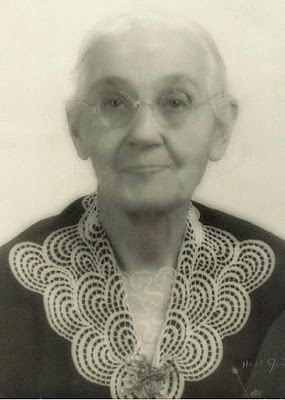Rose of the Desert by Willie Bridges Allen (1867-1942)
Pinola, Mississippi. 1933.
Mayme about the time her mother made the copy.
Portraits are from their Find-a-Grave sites
We find no pictures of the original quilt so we don't know how accurate Willie's copy was. Did the original have a scalloped edge?
And how accurate was the family story? The people of Simpson County, Mississippi, were victims of Union raiders in 1863 and 1864; first Grierson's Raid, a diversion by Union troops to direct Confederate attention away from Grant's campaign to capture Vicksburg.
Grierson with his hand on his chin and his staff.
Grierson made the cover of Harper's in June, 1863.
After the war Lorenda married Private R. L. Bridges of Company B, 16th Mississippi Regiment and moved to Limestone, Texas where they were recorded in the 1870 census with Willie aged 2 and her older sister Beulah. Soon after Lorenda died and Bridges took his daughters back to the small community of Pinola, Mississippi.
Husband (Robert?) remarried and he died in 1913 about the time the hotel in Pinola was built.
Quiltmaker Willie Bridges Allen (1867-1942)
Named for her grandfather Judge William Chandler ?
Willie Bridges married Thomas Wiley Allen (1862-1918). In 1935 Willie and Mayme told the Jackson Clarion Ledger about the lost and found quilt. Mrs. L.T. Steen, Mayme, did not mention the copy so it may be that her mother made it after the newspaper article.
The quilt was lost and found twice. Lorenda took the quilt to Texas and when her widowed husband returned he shipped it to New Orleans but the trunk was misdirected and did not arrive back in Mississippi until a year and a half had passed. The quilt was yellowed when they saw it again.
Telling that story to the reporter might have inspired Willie to make the copy that her daughter carried to Arizona when she moved to Tucson.









3 comments:
Great story! Love this post!
Sweet story. The article says her quilt is a copy, but the original is still in the family. Older sister had it?
Thanks for your blog, as always.
I really appreciate your research! Wonderful story!
Post a Comment